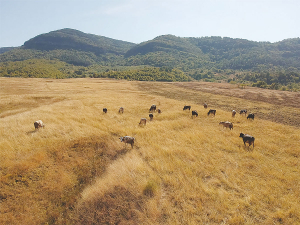Managing Magnesium, Calcium, and Phosphorus in Late Lactation Dairy Cows
OPINION: Late lactation is often viewed as a low-demand phase, when cows are winding down, and we dial down our supplements accordingly.
 Heat stress in cows occurs when they are producing more heat than they are able to get rid of through sweating, respiration, or air regulation.
Heat stress in cows occurs when they are producing more heat than they are able to get rid of through sweating, respiration, or air regulation.
Heat stress in dairy cattle is probably the most overlooked seasonal problem here in New Zealand.
Production drops rapidly as the heat increases, and most farmers simply accept this as a normal seasonal issue that they are powerless to address.
The truth is, there are a number of nutritional strategies that can be used in order to mitigate the effects of heat stress.
It is a well-known fact that cows generate heat in order to create the energy to produce milk, and during the summer this will be out in the paddock in the heat of the sun. Heat stress in cows occurs when they are producing more heat than they are able to get rid of through sweating, respiration, or air regulation.
An overabundance of heat in cows can lead to higher levels of stress, which will affect milk production, fertility, as well as increase the risk of other diseases such as lameness, and can also impair immune function.
Untreated heat stress can be fatal, which is why it’s vital to understand the signs of heat stress, and the best ways in which to prevent it. Watch for changes in behaviour, such as seeking shade, panting, drooling, and standing in water or next to troughs, as signs that your cows may be experiencing heat stress.
When cows are suffering heat stress, feed intake is reduced. This will be accompanied by increased panting and drooling culminating in less saliva reaching the rumen, this decreases rumination by disrupting rumen pH. A healthy rumen is needed for milk yield as well as animal health.
It is therefore important that ruminant animals during periods of high humidity are provided with sufficient nutrients in order to counteract heat stress and maintain strong immunity.
By providing your herd with an easily digestible, nutrient-packed animal tonic that can be blended easily into their feed or added into their water, you ensure that they have the correct balance in place to mitigate the effects of this summer heat stress.
Chris Balemi is managing director, Agvance Nutrition Ltd
Federated Farmers is celebrating following the Government's announcement that young farmers will be able to use their KiwiSaver funds to buy their first home or farm.
The Meat Industry Association of New Zealand (MIA) today announced that Chief Executive Officer Sirma Karapeeva has resigned from the role.
The winners of the 2026 Hawke’s Bay/Wairarapa Dairy Industry Awards were announced at the annual awards dinner held at Copthorne Solway Park in Masterton on Thursday evening.
Environment Southland is welcoming this week’s decision by the Environmental Protection Authority (EPA) to approve the release of Blaptea elguetai, a leaf‑feeding beetle that will help control the highly invasive Chilean flame creeper.
This March, the potato industry is proudly celebrating International Women’s Day on 8 March alongside the International Year of the Woman Farmer, recognising the vital role women play across every part of the sector — from paddocks and packhouses to research, leadership, and innovation.
Fruit trader Seeka posted a record profit and returns to shareholders in 2025.
OPINION: Staying with politics, with less than nine months to go before the general elections, there’s confusion in the Labour…
OPINION: Winston Peters' tirade against the free trade deal stitched with India may not be all political posturing by the…